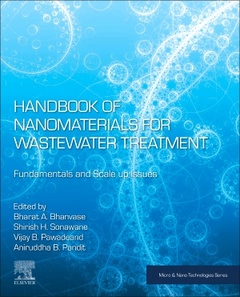Handbook of Nanomaterials for Wastewater Treatment Fundamentals and Scale up Issues Micro and Nano Technologies Series
Coordonnateurs : Bhanvase Bharat A., Sonawane Shirish, Pawade Vijay B., Pandit Aniruddha B.

Handbook of Nanomaterials for Wastewater Treatment: Fundamentals and Scale up Issues provides coverage of the nanomaterials used for wastewater treatment, covering photocatalytic nanocomposite materials, nanomaterials used as adsorbents, water remediation processes, and their current status and challenges. The book explores the major applications of nanomaterials for effective catalysis and adsorption, also providing in-depth information on the properties and application of new advanced nanomaterials for wastewater treatment processes. This is an important reference source for researchers who need to solve basic and advanced problems relating to the use of nanomaterials for the development of wastewater treatment processes and technologies.
As nanotechnology has the potential to substantially improve current water and wastewater treatment processes, the synthesis methods and physiochemical properties of nanomaterials and noble metal nanoparticles make their performance and mechanisms efficient for the treatment of various pollutants.
Section I: Introduction to Nanomaterials for Wastewater Treatment: Fundamentals 1. Introduction to nanomaterials for wastewater treatment 2. Preparation, characterization and physicochemical properties of 0D, 1D, 2D nanomaterials and their role in wastewater treatment 3. Potential risk and application of nanomaterials in environmental management 4. Advanced Technologies for wastewater treatment: New Trends
Section II: Photocatalytic Nanocomposite Materials: Preparation and Applications 5. Introduction, basic principles, mechanism and challenges of photocatalysis 6. Doped TiO2 and doped mixed metal oxide-based nanocomposite for photocatalysis 7. New graphene-based nanocomposite for photocatalysis 8. Luminescent nanomaterials for photocatalysis 9. Magnetic nanomaterials based photocatalyst for photocatalysis 10. Nanomaterials for water splitting and hydrogen generation under visible light
Section III: Adsorbent Nanomaterials: Preparation and Applications 11. Nanomaterials for adsorption of pollutants and heavy metals: Introduction, mechanism and challenges 12. New graphene nanocomposites-based adsorbents 13. Role of zeolite adsorbent in water treatment 14. Metal organic frameworks nanocomposite-based adsorbents 15. Advanced nanocomposite ion-exchange materials for water purification
Section IV: Nanomaterials for Membrane Synthesis: Preparation and Applications 16. Nanomaterials for membrane synthesis: Introduction, mechanism and challenges for wastewater treatment 17. Carbon based nanocomposite membranes for water purification 18. Nanocomposite membranes for heavy metal removal 19. Responsive membranes for wastewater treatment. 20. Nanomaterial-based photocatalytic membrane for organic pollutants removal
Section V: Water Remediation Processes: Current Trends and Scale Up Issues 21. Introduction of water remediation processes 22. Nanocomposite photocatalyst based wastewater treatment processes 23. Nanomaterials based advanced oxidation processes for degradation of waste pollutants 24. Electro-oxidation processes for dye/coloured wastewater treatment 25. Fenton processes: Role of nanomaterials 26. Nanocomposite adsorbent based wastewater treatment processes 27. Nanocomposite/nanoparticle in membranes-based separation for water remediation 28. Process for removal of micropollutants using nanomaterials 29. Antimicrobial activities of nanomaterials in wastewater treatment Nanomaterials for Wastewater Treatment: Concluding
Professor Shirish Sonawane currently workings as Professor at NIT Warangal India and head SRIC center for sponsored research and Industrial Consultancy. He has published more than 200 SCI journal and 36 book chapters and 2 books. He has filed 19 patents out of them 6 patent he been granted. Presently 2 PDF, 7 PhD and 2 M. Tech students are working and 17 Ph.Ds are awarded. Sonoprocess engineering, cavitation based Nanotechnology, Waste water treatment, process development for nanoparticle synthesis, polymer nanocomposite etc. are some of the interest fields. He received funding from MeitY, Govt. of India (2021) and DST WTI project, Govt. of India (2021), earlier he got international projects such as Indo-Tunisia Bilateral Project sponsored by DST, Govt. of India (2017), Indo-Russia DST-RFBR (2018), IMPRINT SERB project (2020), BIRAC-SRISTI- GYTI project, Govt. of India (2017), Department of Information and Technology, Government of India (2014). He is having more than 6000 citations. He is having international collaborations with Australia, Portugal, Russia, Malaysia, Tunisia etc. Dr. Sonawane had also dealt with 19 consultancy projects and 25 R
- Explains the properties of the most commonly used nanomaterials used for wastewater treatment
- Describes the major nanoscale synthesis and processing techniques for wastewater treatment
- Assesses the major challenges for using nanomaterials on a mass scale for wastewater treatment
Date de parution : 07-2021
Ouvrage de 1216 p.
19x23.3 cm
Thème de Handbook of Nanomaterials for Wastewater Treatment :
Mots-clés :
Nanotechnology; Nanomaterials; Nanosynthesis; Nanoprocessing; Wastewater



